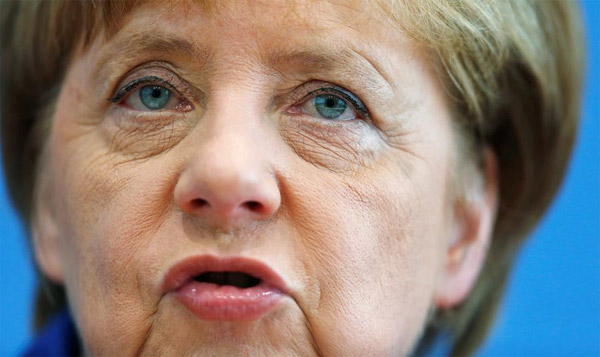Defiant Merkel cuts short holiday to defend response to attacks
(Agencies) Updated: 2016-07-29 10:46
 |
|
German Chancellor Angela Merkel addresses a news conference in Berlin, Germany, July 28, 2016. [Photo/Agencies] |
BERLIN - Chancellor Angela Merkel defended her leadership style on Thursday after she remained on vacation this week following Islamist attacks in Germany that critics have blamed on her open-door refugee policy.
Interrupting her holiday to hold a news conference, Merkel batted away questions about why she had not visited the scene of any of five attacks committed since July 18 that have left 15 people dead - including four attackers - and dozens injured.
"A decision has to be taken on this each time and perhaps some members of the public have a different view to the way I decided to do things," she told a news conference, adding that she would attend a memorial ceremony on Sunday in Munich.
Munich was the scene of the bloodiest of the attacks, in which an 18-year-old German-Iranian gunman killed nine people. Merkel faced criticism on social media after failing to react until the next day, 17 hours after U.S. President Barack Obama.
"I have the feeling that I acted responsibly and correctly and no other feeling," she told Thursday's packed news conference, condemning two attackers who were refugees for mocking Germany and the other refugees the country has welcomed.
The attacks in Germany have led to accusations from Merkel foes and even some allies that her open-door refugee policy is to blame after over a million migrants entered the country in the past year, many fleeing war in Afghanistan, Syria and Iraq.
Two assailants, a Syrian asylum seeker who blew himself up in Ansbach and a refugee from either Pakistan or Afghanistan who attacked people on a train in Bavaria, had links to Islamist militancy, officials say, although the Munich gunman did not. The attacks have burst any illusions in Germany that the country is immune to attacks like those claimed by Islamic State in neighbouring France.
"Angst cannot be the guide for political action," Merkel said, setting out a nine-point plan to respond to the attacks, including measures to recruit more staff for security agencies, and an early warning system for the radicalisation of refugees.
Merkel's methodical response is in stark contrast to that of French President Francois Hollande, who has rushed to the scene of recent attacks. On Tuesday, he visited Normandy where two assailants killed a priest.
In Britain too, former Prime Minister David Cameron joined opposition Labour leader Jeremy Corbyn last month to lay flowers in the town of Birstall, Yorkshire, where lawmaker Jo Cox was killed days before Britain's vote on European Union membership.
Merkel's response to the German attacks is not the first time her pragmatic, problem-solving approach has laid her open to accusations of heartlessness.
Last year, the chancellor was mocked online after reducing a Palestinian girl to tears by explaining her policy on asylum and adding that "sometimes politics is hard".
"WE CAN DO THIS"
Asked if she was exhausted, Merkel told the news conference "sometimes I do like to go to bed in the evening", before adding: "I am not without too much to do."
Merkel's popularity, already eroded by the refugee crisis, is likely to suffer again after a temporary boost following Britain's vote last month to leave the European Union.
But the chancellor defended her open-door refugee policy, defiantly repeating the mantra of "Wir schaffen das", or "We can do this," that she adopted last summer when Germany opened its doors to migrants fleeing wars in the Middle East.
"We can do this and we have already done a lot over the past 11 months," she said.
"The terrorists want to make us lose sight of what is important to us, break down our cohesion and ... our willingness take in people who are in need," Merkel said.
"They sow hatred and fear between cultures and they sow hatred and fear between religions. We stand decisively against that."






